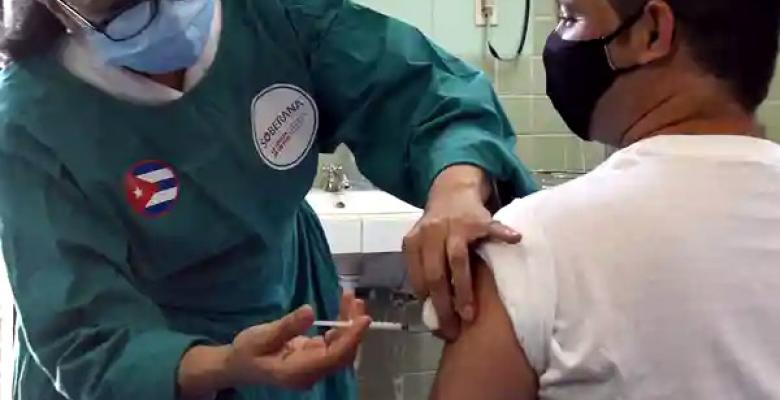Cuba punches above its weight to develop its own Covid vaccines
especiales

Hit by the double whammy of US sanctions and a pandemic, Cuba is going through its gravest economic crisis since the collapse of the Soviet Union. Pharmacy shelves are barren. People queue for hours to buy chicken. It’s hard to find bread.
And yet this island under siege could become the smallest country in the world to develop its own coronavirus vaccines. Of the 27 coronavirus vaccines in final stage testing around the world, two are Cuban.
“To have our sovereignty we need our own vaccines,” said Dr Vicente Vérez, director of the Finlay Institute, which has developed Sovereign 2, the most advanced of the country’s five vaccine candidates. “In nine months we have gone from an idea to a vaccine in phase three clinical trials.”
About 44,000 volunteers in Havana are currently participating in phase three trials for Sovereign 2. A similar number in the eastern city of Santiago are volunteering for phase three for Abdala, a vaccine named after a poem by José Martí, the island’s official “national hero”.
Running alongside the clinical studies is an “interventional study” in which 150,000 health workers in Havana are now being vaccinated.
Cuba’s “biological front” was established in 1981 – just five years after the incorporation of the world’s first biotech company, Genentech. At the heart of today’s drive for a vaccine are the island’s top scientists, many of whom were trained in the former Soviet Union. These internationally mobile polyglots have every opportunity to emigrate (and many do); those who chose to work on the island are almost invariably old school believers.
At a recent press conference Dr Vérez explained what drives him by quoting Ernesto “Ché” Guevara. “The true revolutionary,” he said, “is guided by a great feeling of love”.
Dr Gerardo Guillén, who heads up development of two vaccines at the Center for Genetic Engineering and Biotechnology, is a chocoholic who has had to do without his favourite fix for over a year (there is none in the shops). His £200 a month salary is a hundred times less what he could earn abroad.
“We do have offers,” said Dr Mitchell Valdés-Sosa, a Chicago-born neurologist who sits on the country’s coronavirus taskforce. “But we prefer to stay because we feel a commitment to the development of our country. We’re not working to make some chief executive obscenely rich; we’re working to make people healthier.”
Such idealism is no protection from bitter geopolitical realities.
The US embargo on Cuba restricts the medical equipment the island can import. The different Cuban research teams working on the vaccines share just one spectrometer – a machine essential for quality control – powerful enough to analyse a vaccine’s chemical structure. But since the spectrometer’s British manufacturer, Micromass, was bought out by an American firm, Waters, they haven’t been able to buy spare parts directly.
While UN human rights rapporteurs called on the US to lift sanctions on the island during the pandemic, over the past 12 months the embargo has been ramped up.
And since the outgoing Trump administration put Cuba on the US list of state sponsors of terrorism in January, just finding a bank willing to process payments has become a major problem.
“The US is trying to starve Cuba into submission,” said Valdés-Sosa. “It’s not only that it’s difficult to buy things directly from the US. It’s also that all these sanctions that the Trump administration put in place have dried up many sources of revenue.”
Cuba reported 12,225 confirmed cases and 146 deaths last year – among the hemisphere’s lowest case and mortality rates. But in November came a blunder. When commercial flights finally resumed after seven long months, for a few weeks the government did not require visitors to take PCR tests before boarding planes. The effect was lethal: thousands of Cuban Americans came from Covid hotspots like Florida to hug, kiss and dance with their families over the Christmas period, leading to a surge in cases.
More cases were reported January alone than in the whole of 2020, and the island is now averaging 1,000 confirmed cases a day.
With around 100,000 Cubans having received the jab so far, the island is behind the average Latin American vaccine rollout of 12% of people having received at least one dose. And with no vaccine yet fully approved for use by the island’s regulator, critics say the Communist party’s decision not to join Covax, the UN-backed mechanism to distribute Covid-19 doses fairly around the world, was arrogant and has left them needlessly exposed.
Cuba aims to manufacture 100m doses of Sovereign 2 this year – enough for the population with a surplus to export.
If and when production hurdles are cleared, the logistics of distribution should be a strong point: the island has a well-developed infrastructure of local community clinics, and the highest doctor-to-patient ratio in the world.
Cuban scientists are confident the widespread vaccination will be attained this year, and say Cuba will be among the first countries in the hemisphere to achieve this.
“When you have everything, you don’t have to think so much.” said Dr Guillén, “But when you have difficulties, you have to think up new ways to innovate”.













Add new comment